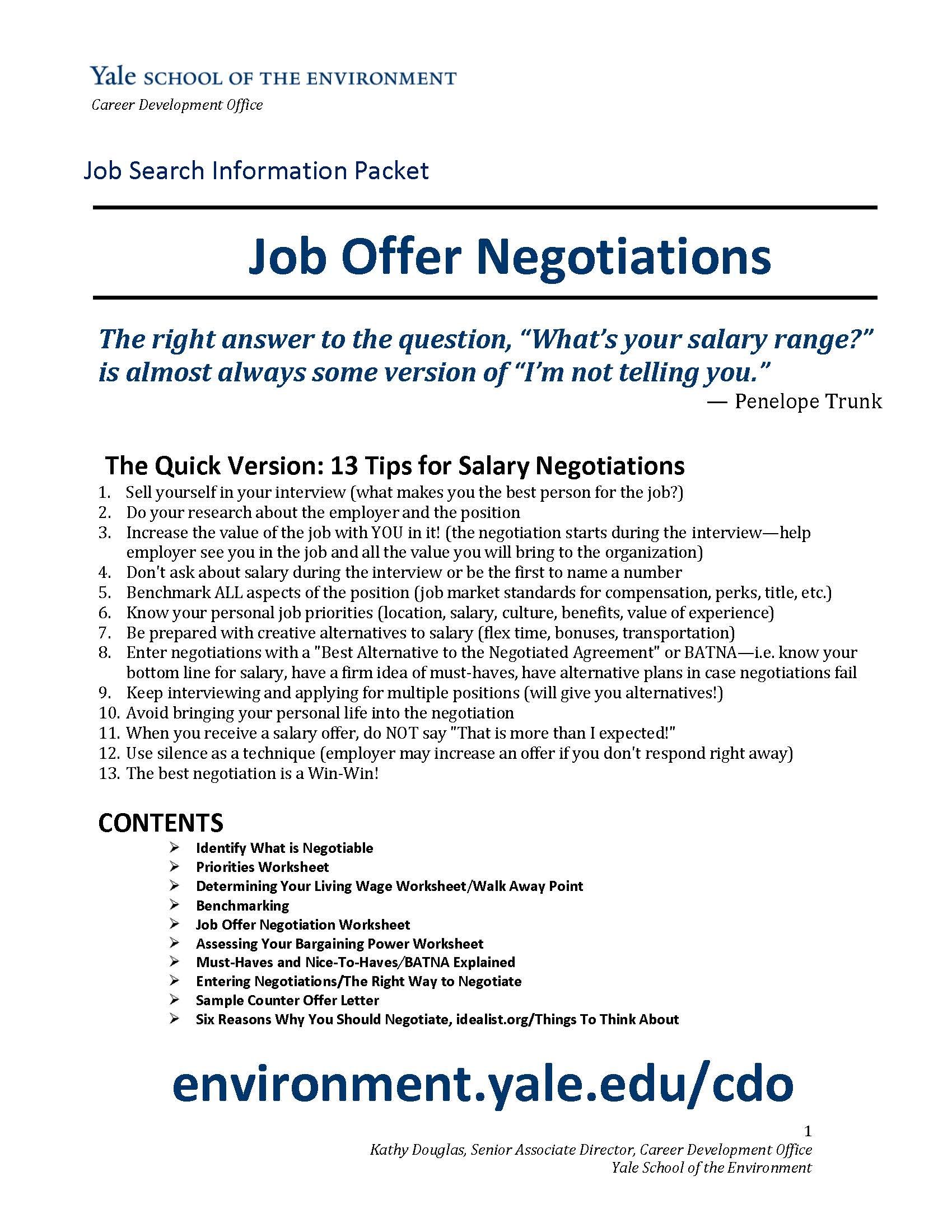Looking to negotiate a salary offer for a new job? You’ve come to the right place! In this article, we’ll guide you through the process of effectively advocating for your worth and securing the compensation you deserve. Negotiating a salary offer can be intimidating, but with the right approach and preparation, you can increase your chances of reaching a mutually beneficial agreement. From refining your research skills to leveraging your accomplishments, we’ll provide you with practical tips and insights to navigate this crucial aspect of the job-seeking journey. So, let’s dive in and explore how to negotiate a salary offer for a new job!
How to Negotiate a Salary Offer for a New Job
Starting a new job is an exciting opportunity, but before you jump right in, there’s an important aspect to consider – salary negotiation. Negotiating your salary offer is crucial to ensuring fair compensation for your skills and experience. It can also set the tone for future salary increases and career advancement. In this article, we will provide you with a comprehensive guide on how to negotiate a salary offer for a new job, empowering you to advocate for yourself and achieve the best possible outcome.
1. Research Salary Data for Your Role and Industry
Before initiating any salary negotiation, it’s essential to gather relevant salary data for your role and industry. This information will provide you with a benchmark to evaluate the fairness of the initial offer and support your negotiation arguments. Here are some reliable sources to consider:
- Online Salary Databases: Websites like Glassdoor, Payscale, and LinkedIn Salary Insights offer insights into average salaries for specific job titles and locations.
- Professional Associations: Industry-specific associations often conduct salary surveys. Joining these associations and accessing their research can provide valuable salary information.
- Networking: Reach out to professionals in your industry to gather insights on salary ranges. Their experiences and knowledge can help you gauge salary expectations.
2. Evaluate Your Skills and Experience
Knowing your own worth is crucial to negotiating a salary offer. Take the time to evaluate your skills, experience, and qualifications relative to the position. Consider the following factors:
- Educational Background: Assess the level of education you have completed and any certifications or additional training you possess.
- Work Experience: Evaluate the number of years you have spent in similar or related roles. Highlight any relevant accomplishments, promotions, or specialized expertise.
- Unique Skills: Identify any specific skills or qualifications that set you apart from other candidates and provide value to the organization.
By understanding your unique value proposition, you can articulate your worth confidently during salary negotiations.
3. Determine Your Desired Salary Range
After conducting thorough research and evaluating your skills and experience, it’s time to determine your desired salary range. This range should be realistic, taking into account industry standards, your level of expertise, and the company’s financial situation. Consider these factors:
- Minimum Acceptable Salary: Identify the lowest salary figure you are willing to accept while still feeling fairly compensated.
- Ideal Salary: Determine the salary you believe accurately reflects your skills, experience, and the value you bring to the organization.
- Stretch Goal: Set a higher salary figure that represents a stretch goal, providing room for negotiation and potentially exceeding your expectations.
Creating a salary range equips you with flexibility during negotiations and allows room for compromise.
4. Highlight Your Value During Negotiations
When negotiating your salary, it’s important to clearly articulate the value you bring to the company. Employers are more likely to agree to a higher salary if they understand how you will contribute to their success. Consider the following strategies:
- Quantify Achievements: Highlight specific achievements and quantify their impact on previous employers. For example, mention how you increased sales by a certain percentage or saved the company a specific amount of money.
- Emphasize Unique Skills: Showcase any unique skills or qualifications that directly align with the job requirements. Discuss how these skills can positively impact the organization.
- Show Cultural Fit: Demonstrate your understanding of the company’s values, mission, and culture. Highlight how your personality and work ethic align with the organization’s goals.
By emphasizing your value, you can make a compelling case for a higher salary.
5. Practice Effective Communication
Strong communication skills are crucial during salary negotiations. Here are some tips to help you effectively convey your thoughts and negotiate successfully:
- Be Assertive: Express your needs and expectations clearly and confidently. Avoid being too passive or aggressive. Aim for a respectful and assertive tone.
- Listen Actively: Pay close attention to the employer’s response and concerns. Listening actively shows your willingness to engage in a constructive dialogue.
- Ask Questions: Seek clarification about any aspects of the offer that are unclear or need further discussion. This demonstrates your genuine interest and commitment.
- Be Prepared for Objections: Anticipate potential objections or counteroffers from the employer. Prepare thoughtful responses to address these concerns effectively.
Effective communication will help you convey your worth and negotiate with confidence.
6. Consider Non-Salary Benefits
While salary is a significant factor, don’t overlook the importance of non-salary benefits. These can contribute to your overall compensation package and improve your work-life balance. Consider the following benefits:
- Healthcare Coverage: Evaluate the quality and coverage of the company’s health insurance plans.
- Retirement Plans: Assess the employer’s retirement savings options, such as 401(k) plans or pension contributions.
- Paid Time Off: Consider the company’s vacation, sick leave, and parental leave policies.
- Professional Development: Inquire about opportunities for ongoing training, mentorship, or conferences.
- Flexible Work Arrangements: Assess the company’s policies on remote work, flexible hours, or compressed workweeks.
Remember to consider the overall benefits package when evaluating the fairness of a salary offer.
7. Be Prepared to Negotiate and Compromise
Approach salary negotiation as a collaborative process rather than a battle. Be prepared to negotiate and find common ground. Consider these tips:
- Remain Flexible: Be open to alternative compensation structures, such as bonuses, stock options, or performance-based rewards.
- Focus on Total Compensation: If the employer cannot meet your desired salary, explore opportunities for additional benefits or perks that hold value for you.
- Avoid Ultimatums: Maintain a respectful and professional tone throughout the negotiation process. Avoid making ultimatums or threats that could harm your chances.
- Know Your Walk-Away Point: Determine the point at which the offer is no longer acceptable. This will help you make informed decisions during negotiation.
Negotiation is about finding a mutually beneficial agreement where both parties feel satisfied.
8. Follow Up with a Thank-You Note
After completing the negotiation process, it’s crucial to follow up with a thank-you note. Express your gratitude for the employer’s time and consideration. This gesture reinforces your professionalism and leaves a positive impression.
In conclusion, negotiating a salary offer for a new job requires thorough research, self-assessment, effective communication, and a willingness to find common ground. By following the steps outlined in this guide, you can navigate the negotiation process with confidence and achieve a salary that reflects your worth and contribution.
How to Negotiate Salary after Job Offer | 5 Practical Tips
Frequently Asked Questions
Frequently Asked Questions (FAQs)
1. How can I negotiate a salary offer for a new job?
To negotiate a salary offer for a new job, follow these steps:
- Research the market value: Gather information on average salaries for similar roles in your industry and location.
- Consider your qualifications: Assess your skills, experience, and education to determine your worth.
- Identify your desired salary range: Determine the minimum and maximum salaries you are willing to accept.
- Highlight your value: Clearly articulate your accomplishments and contributions during the interview process.
- Express your interest: Once the offer is made, express your enthusiasm for the job while diplomatically negotiating for a higher salary.
- Be open to other benefits: If the employer is unable to meet your salary expectations, negotiate for additional benefits such as flexible working hours, professional development opportunities, or bonus structures.
- Stay professional: Maintain a respectful and collaborative attitude throughout the negotiation process.
2. What if the employer asks for my salary expectations first?
If the employer asks for your salary expectations first, it’s recommended to provide a salary range rather than a specific figure. This allows for flexibility during negotiations. However, do ensure that the lower end of the range aligns with your minimum salary requirement.
3. Is it possible to negotiate a salary for an entry-level position?
Yes, it is possible to negotiate a salary for an entry-level position. While entry-level salaries may have predefined ranges, there is often room for discussion. Emphasize your skills, education, internships, and any relevant experience that sets you apart from other candidates. Highlighting your potential and commitment to the role can strengthen your negotiation position.
4. What if the employer refuses to negotiate the salary offer?
If the employer refuses to negotiate the salary offer, consider other aspects of the job that can be negotiated, such as additional vacation days, work-from-home options, flexible hours, or opportunities for career growth and development. Sometimes, employers may have limitations due to budget constraints, so be open to finding compromises that benefit both parties.
5. How should I conduct myself during a salary negotiation?
During a salary negotiation, it’s important to be confident, respectful, and professional. Clearly and assertively communicate your value, emphasizing your skills, experience, and achievements. Listen actively to the employer’s perspective and be open to finding a mutually beneficial agreement. Avoid being confrontational or demanding, as it may negatively impact the negotiation process.
6. What if the salary offer is lower than what I expected?
If the salary offer is lower than your expectations, it’s important to remain calm and consider your options. Rather than immediately rejecting the offer, express your gratitude for the opportunity and ask if there is room for negotiation. Highlight your qualifications and the value you can bring to the company. If the employer cannot increase the salary, explore other benefits or opportunities for growth within the company.
7. Can I negotiate salary after accepting a job offer?
It is possible to negotiate salary after accepting a job offer, but it can be more challenging. If you find it necessary to negotiate after accepting the offer, approach the conversation with transparency and explain the reasons for your request. Emphasize your commitment to the role and your desire for a fair and equitable compensation package. However, keep in mind that there is no guarantee the employer will be open to renegotiation.
8. What if I am unsure how much salary to negotiate for?
If you are unsure about how much salary to negotiate for, it’s crucial to conduct thorough research on industry standards, job market conditions, and the specific company you are applying to. Utilize salary comparison websites, industry reports, and networking to gain insights into the appropriate salary range. Additionally, seek advice from mentors, professionals in your field, or career counselors to help you determine a fair and reasonable salary negotiation strategy.
Final Thoughts
Negotiating a salary offer for a new job can be a critical step in securing the compensation you deserve. Firstly, conduct thorough research to understand the industry standards and determine your market value. Highlight your skills, accomplishments, and unique qualifications during discussions with the employer. Clearly express your expectations and be open to compromise. During negotiations, maintain a confident and respectful demeanor. Remember, it is important to focus on the value you bring to the organization rather than simply demanding a higher salary. By following these steps, you can effectively negotiate a salary offer for a new job.



